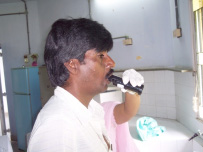- info@rapidbiosensor.com
- Tel +44 (0)1223 264558
- © 2020 Rapid Biosensor Systems
A Revolution in TB Screening
World TB Day on March 24 will have particular significance for Cambridge-based Rapid Biosensor Systems (Rapid Biosensor). After an intensive six-year development programme, the company's innovative TB Breathalyser will be in active use for the first time - delivering instant, reliable and cost-effective screening for early stage infection with tuberculosis at the point of care.
Set to revolutionise screening for tuberculosis and other infectious diseases in humans, The Rapid Biosensor breathalyser is based on patented bio-optical sensor technologies and is a complete, lightweight and portable system. It is also the fastest and most reliable method available for detecting infected subjects capable of transmitting TB to others, providing a result in minutes to a verified accuracy level of +95%.

According to the WHO, 8.8 million active cases of TB are diagnosed each year and of these, almost 2 million die. Once thought to be under control or even close to extinction, TB infection levels are rising and the threat is compounded by new, virulent and drug-resistant strains. Although most cases occur in the developing world - with 22 countries accounting for 80% of all global cases - increasing population mobility combined with facility of transmission means that no country is immune from the resurgence of TB.
Dennis Camilleri, Chief Executive Officer of Rapid Biosensor, is confident that the many advantages of the device over current screening methods will arouse significant interest among stakeholder groups in TB care. "The most prevalent method of screening currently is the Mantoux TB test, which involves a health worker injecting test fluid under the patient's skin, then waiting for up to 72 hours to see if there is a localised reaction that indicates the presence of TB. There are however, many factors that can influence the reaction, meaning that expert assessment - and with it a degree of subjectivity - is involved in interpreting the results. Further, the test is prone to delivering false positives or false negatives, implying that further testing and interpretation may be required.
"By contrast, the Rapid Biosensor Breathalyser delivers an unequivocal positive or negative result within minutes, with no interpretation required. Significantly, it is highly specific to detecting active TB and is not compromised by the presence of HIV or other co-infections. The unit is extremely portable and easy to use and requires no running water or electricity for operation, it can therefore be deployed in remote locations, without the need for subjects to attend a screening clinic."
The performance of the Breathalyser has been validated thus far in a series of extensive clinical trials within a hospital environment in India and in independent trials in Ethiopia supervised by the London School of Hygiene and Tropical Medicine.
The Breathalyser is to be launched first in India and South Africa, who are ranked first and fifth respectively on the WHO list of high burden TB countries. The social and humanitarian need for more effective screening is urgent, with TB is at near-pandemic levels in both countries. Concurrent with the launch, Rapid Biosensor will begin the approvals processes via both the FDA and the MHRA that will be required to allow use of the Breathalyser in Europe and the USA.
The use of breathalyser technology for TB screening is unprecedented, meaning that the approvals process could take anywhere from six to eighteen months. However, Mr Camilleri is optimistic that its non-invasive nature, combined with evidential proof of its efficacy amassed via the various trials, will make for speedy approval.
"TB is one of the greatest threats to global health and the terrifying ease with which it is transmitted means that national boundaries and global demographics are irrelevant in preventing its spread," he says. "Approval of the Rapid Biosensor Breathalyser will enable governments and health agencies to institute screening where it is most needed, be that in the field with susceptible populations, or at other locations such as ports of entry."
"Identifying where treatment is required and beginning that treatment at the earliest opportunity is the most effective means of controlling TB infection rates: we are confident that our Breathalyser has the potential to be a highly-effective weapon in this fight."